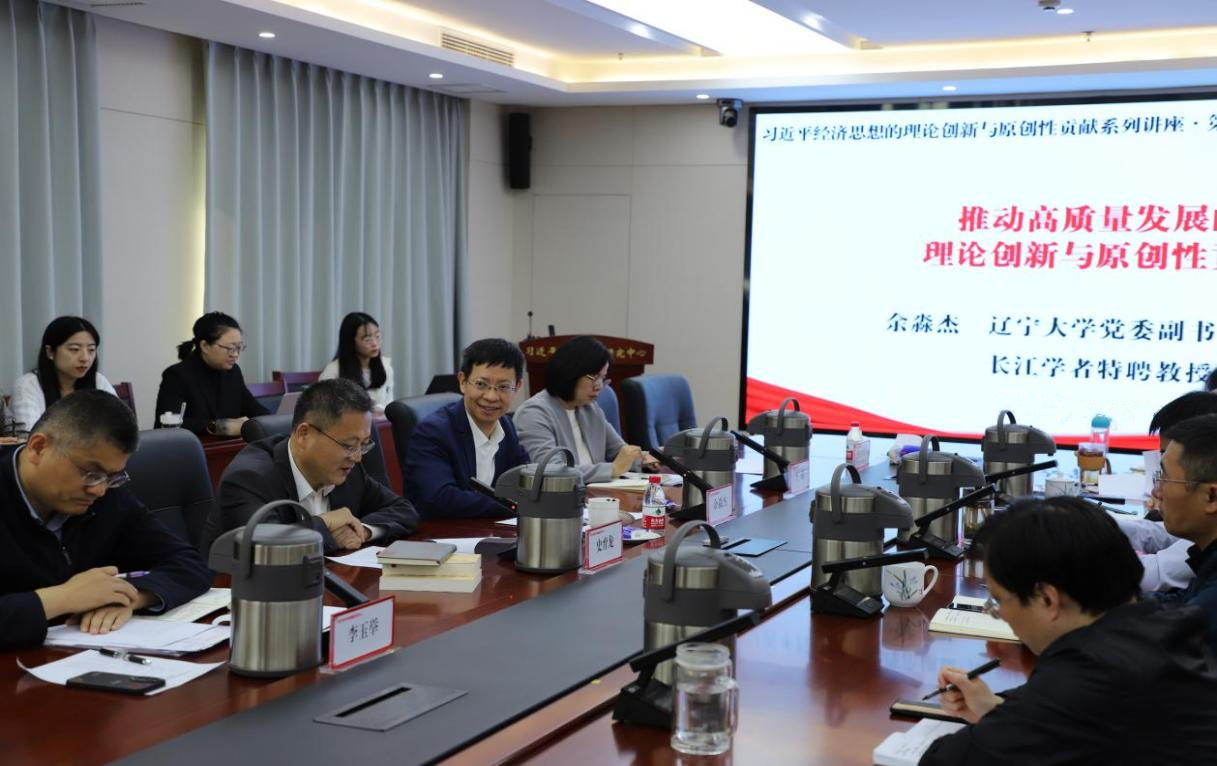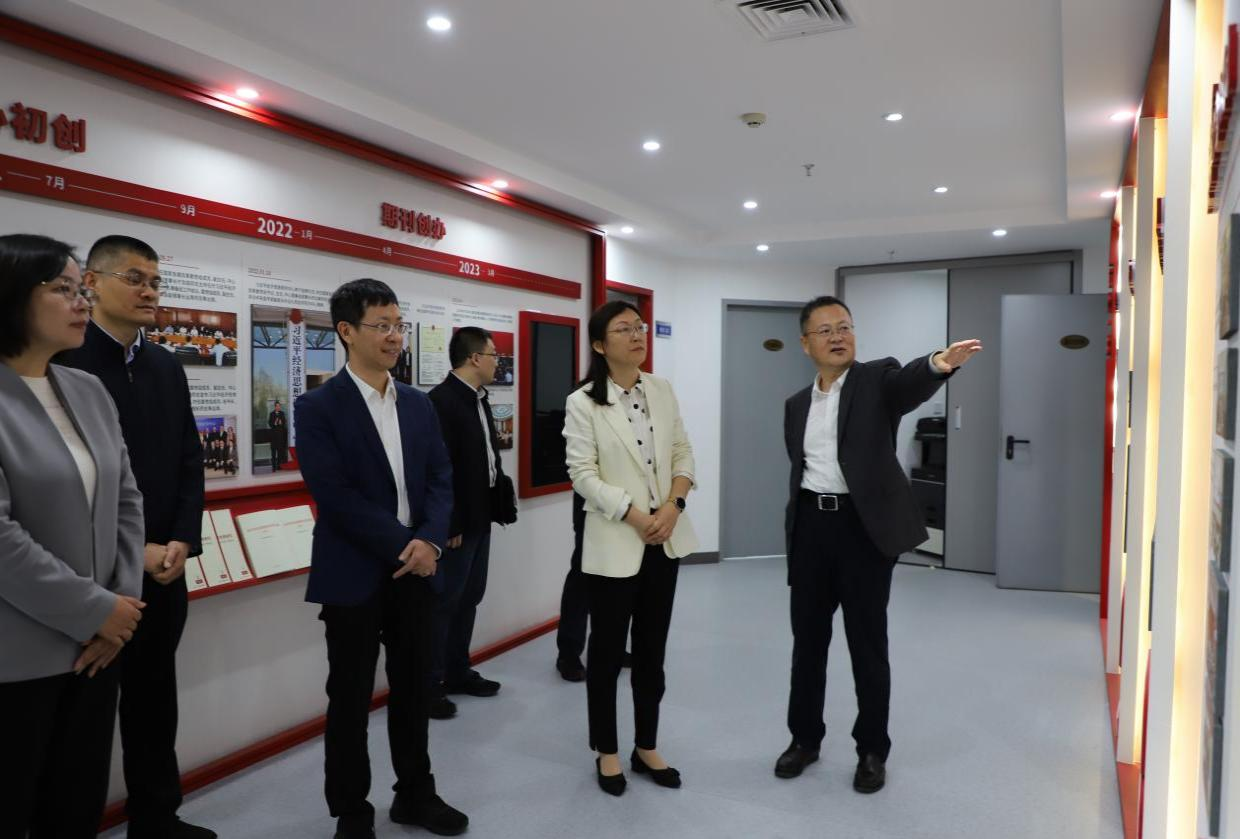Professor Yu Miaojie, Deputy Secretary of the CPC Committee and President of Liaoning University, was recently invited to the Xi Jinping Economic Thought Research Center of the National Development and Reform Commission. He delivered a lecture titled ‘Theoretical Innovation and Original Contribution to Promote High-Quality Development’. Director Shi Yulong of the Xi Jinping Economic Thought Research Center introduced the center’s study, research, and promotion of Xi Jinping’s economic thought. Yu Miaojie elaborated on the significance of the ‘Three News and One High’ concept in Xi Jinping’s economic thought. Additionally, he gave an in-depth explanation of the characteristics of China’s entry into a new development stage, emphasized the guidance principle of combining problem orientation with goal orientation, and delved into the essence of the dual circulation theory.

Yu Miaojie pointed out that despite the turbulent international environment and challenging reform and development tasks, under the strong leadership of the Party Central Committee, China has entered a new development stage characterized by high-quality economic growth. He explained the characteristics of high-quality economic development from the micro, medium, and macro levels of the supply side. At the micro level, there is an improvement in product quality and an increase in value-added. At the medium level, there is a significant increase in overall factor productivity, complete industry chains, and industry clustering. At the macro level, there is a coordinated proportion within the overall industrial division of labor. These six aspects demonstrate the high-quality development features of China’s supply side.
Yu Miaojie emphasized the importance of combining the five new development concepts with goal orientation and problem orientation. Firstly, innovation is the primary driving force. Currently, China’s investment in innovation is close to the OECD average, and the output of innovation is considerable but lacking in quality. Narrow innovation is equally important as broad innovation, which includes innovation in rules, regulations, standards, and management: for example, free trade pilot zones, negative lists, and optimizing the business environment. Innovation in free trade pilot zones should emphasize replicability and scalability while also adapting to local conditions and leveraging their own characteristics. Mechanism for attracting high-end talent should also be implemented.
Secondly, green development should be universal. Green environmental protection is a global topic for dialogue, but there are still many issues that have not reached a consensus, such as the starting point of carbon emission accounting, production and consumption responsibility, and the core and difficult points of dual carbon issues. Yu Miaojie believes the most important aspect is to increase the proportion of non-fossil energy consumption in primary energy and phase out traditional energy sources.
Thirdly, coordination is an inherent feature. Yu Miaojie believes that coordination refers to regional coordination, urban-rural coordination, and industry coordination. The development of new industrial modernization and urbanization should be well-coordinated. If the disparity is too large, it will impact economic development and social stability. Urban development needs to be decentralized, and the urban-rural development gap needs to be bridged.
Fourthly, the ultimate developmental goal is sharing. Yu Miaojie points out that sharing needs to consider poverty alleviation, rural revitalization, and common prosperity. It is necessary to adhere to the poverty alleviation strategy and prevent large-scale returns to poverty. Rural revitalization relies on industrial revitalization. Emphasis should be placed on fair opportunities rather than equal outcomes, and a balance between fairness and efficiency should be maintained. The three income distribution mechanisms should be optimized, and corruption reduced.
Lastly, openness is the only way forward. Yu Miaojie believes that the key point of the new development paradigm is dual circulation, wherein the most important task of internal circulation is to build a unified large domestic market, while steadfastly expanding the state-owned economy and strengthening the private economy. External circulation should focus on diversifying export destinations, expanding imports by enterprises, developing service trade, encouraging enterprises to go global, and concentrating efforts on developing the ‘Belt and Road’ initiative.
Yu Miaojie proposed that in the new stage of development, China should comprehensively and fully implement the new development concept. The new development concept is the fundamental guiding principle of Xi Jinping’s economic thought, which includes innovation as the primary driving force, coordination as an inherent feature, green development as a universal mindset, opening up as an inevitable path, and shared development as the ultimate goal. In the process of implementing the five major goals of the new development concept, China should combine problem-oriented and goal-oriented approaches, seek truth from facts to solve various difficulties and bottlenecks, use the dual circulation concept as a driving force to build a new development pattern, and realize Chinese-style modernization, ultimately achieving the great rejuvenation of the Chinese nation.

Director Shi Yulong praised President Yu Miaojie’s lecture, specifically pointing out the richness of information, detailed data, and ability to effortlessly cite cases from various regions, fully demonstrating the style of a master of economics. The attendees responded enthusiastically, and President Yu Miaojie gave brilliant answers to various questions.
Wang Yun, Deputy Director of the Xi Jinping Economic Thought Research Center, Li Yuju, Deputy Director, Zhang Xinmei, a second-level inspector from the Employment Department of the National Development and Reform Commission, Li Qinfang, a third-level researcher from the Openness Department of the National Development and Reform Commission, as well as officials from the Policy Research Office, Regional Department, Environmental and Resources Department, Employment Department, Price Department, Evaluation and Supervision Department of the National Development and Reform Commission, the entire staff of the Xi Jinping Economic Thought Research Center, and others from affiliated units, attended the lecture and participated in exchanges.
The Xi Jinping Economic Thought Research Center, under the approval of the Central Committee of the Communist Party of China, is a physical institution established within the National Development and Reform Commission. The Xi Jinping Economic Thought Research Center, with the goal of being “national-level, authoritative, open, and influential”, has become an important platform for in-depth study of Xi Jinping’s economic thought. It is also a key think tank for systematic research on Xi Jinping’s economic thought, as well as a crucial platform for its promotion and implementation. It is a significant battleground for interpreting and disseminating Xi Jinping’s economic thought.
